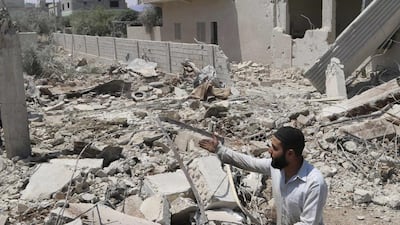Over the past few weeks, the governments in both Baghdad and Damascus seem to have found allies in groups inside ISIL-controlled territories.
Albu Nimr, an Iraqi tribe, is part of the powerful Dulaim tribal confederation that spans both Iraq and Syria. ISIL executed at least 150 members of the tribe after taking over Heet last month. Members of the tribe have made widespread appeals for help – from their longtime adversaries within the Shiite militias of Muqtada Al Sadr to the Americans and the Israelis.
In Syria, hundreds of members of the Shaitat tribe were slaughtered as ISIL overran the province of Deir Ezzor in August. Now it is reported that some surviving tribe members have been working closely with the Syrian regime. The regime has established a secret training camp dedicated to members of the 200,000-member tribe in Deir Ezzor. Inside Damascus, according to sources, the regime has also released Shaitat members from prisons and is treating its members particularly well.
Both of these tribes are known for their enmity to their respective governments and extremists alike. Albu Nimr fought ISIL’s previous incarnation during the 2005-2006 Sunni uprising against Al Qaeda in Anbar, and were longtime critics of Nouri Al Maliki’s government in Iraq. Shaitat was one of the first to rise up against Syrian president Bashar Al Assad and expel regime forces from their areas in 2012. Shaitat militias have fought against ISIL for months.
The scale of the violence committed against these tribes has pushed them to seek the help of their previous enemies. But the question remains whether the latest developments will have an impact on the ground. For three main reasons, the answer seems to be that it won’t.
The first reason is that ISIL has a counter-strategy. Abu Bakr Al Baghdadi, the jihadist group’s leader, this week ordered displaced members of the Shaitat tribe to return to their homes. The jihadist group had previously declared the tribe a ta’ifa mumtani’a, an Islamic reference to a group that has to be fought to the last man and no reconciliation or compromise can be reached with them. The change in tack is part of a wider trend. ISIL has recently prevented its members who were a cause of tensions with local communities from having any leadership role in these areas.
The second reason why the current tribal agitation will not have an impact is that segments of these same tribes are either still opposed to these governments or are supporters of ISIL. Working with these governments will only increase division within these tribes, rather than present a challenge to the jihadist group. According to Syrian journalist Abdullah Raja, who spoke to Shaitat fighters last month, most of the Shaitat tribe oppose any plan to work with the regime against ISIL despite their profound sense of helplessness.
Another factor that makes such developments less likely to present a true challenge to ISIL is the fact that the governments in Iraq and Syria have no intention of allying with these groups. The Assad regime is trying to use the Shaitat tribe temporarily to present itself as capable of instigating rebellion against ISIL from within.
The regime could have helped the Shaitat repel ISIL’s attacks on their areas in July as its warplanes distributed leaflets encouraging the tribe to rise up against ISIL. The regime is only interested in using its links to members of the Shaitat as a political card. The same goes for the Iraqi government, which already refused to arm the Sunni tribes unless they join the Hashd Al Shaabi, the Shia-dominated militias affiliated to the security forces.
Attitudes towards ISIL vary, but people generally seem to be united by their profound disillusionment with their governments more than any desire to rise up against the jihadist group.
Hassan Hassan is an analyst with the Delma Institute
On Twitter: @hxhassan

